Afghans set to defy the Taliban in presidential vote
- Published
- comments
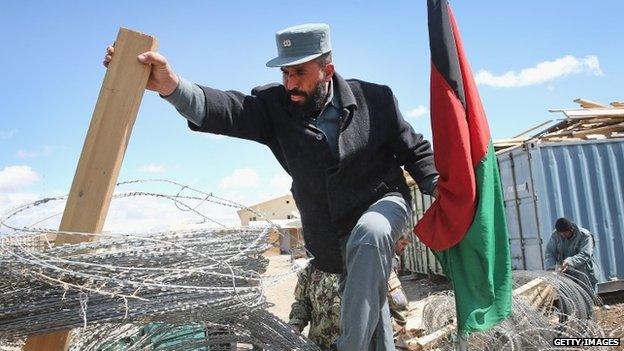
A huge security operation is being launched in advance of Saturday's presidential vote
There's nothing like an election when it's not certain who will win, when candidates campaign like every vote counts, and voters are engaged.
That's Afghanistan in 2014.
This third presidential race since the fall of the Taliban is also certain to be marred by rigging, recrimination and violence.
The run-up to this historic poll on 5 April has already been the bloodiest.
And fears of electoral fraud are pronounced.
But behind the stark, dark headlines, a new political culture is slowly emerging with the grammar of elections, not the guns and grabs of war that once decided who would rule.
An Islamist warlord talks about women's rights, a former finance minister urges voters to take him to the palace, and an Afghan may make history by becoming the first female vice-president.
Top contenders in a real race to replace Hamid Karzai have been zipping across the country, sometimes staging big boisterous rallies in more than one province in a day.
This time presidential tickets, which also include two vice-presidents, cut across ethnic lines.
President Karzai admitted to me last year that he played a key role in suggesting running mates to top contenders.
Some of them make strange bedfellows, but such is the roughly woven fabric of Afghanistan.
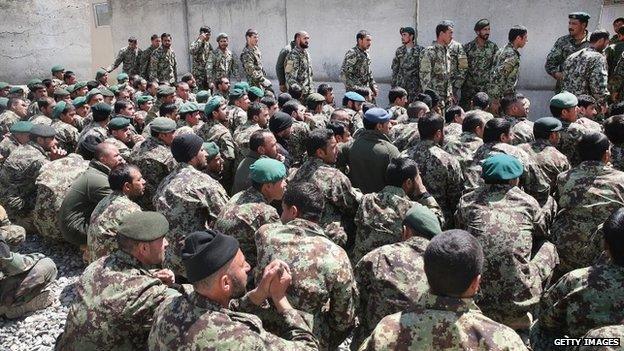
Afghan National Army (ANA) soldiers will be deployed to boost security in the run-up to the vote
For the first time since the first presidential election in 2004, there is not much, if any, discussion about who is "America's candidate".
But there is a lot of talk about who is President Karzai's man.
Many assume it is his former foreign minister and loyal ally Zalmai Rassoul.
My own conversations with the president in recent months suggest his thinking may not be so clear-cut.
There is some cynicism that the only real change at the palace will be that Hamid Karzai will continue to operate behind the scenes.
Much will depend on whether a clear front-runner emerges at the head of a pack which now numbers eight presidential hopefuls.
Saad Mohseni, who heads the Moby Group that includes the popular Tolo TV, said their polls indicate the number of undecided voters may be as high as 30-40%.
"Some people get a free lunch, some are intimidated," he said of candidate tactics to persuade people to get out and vote.
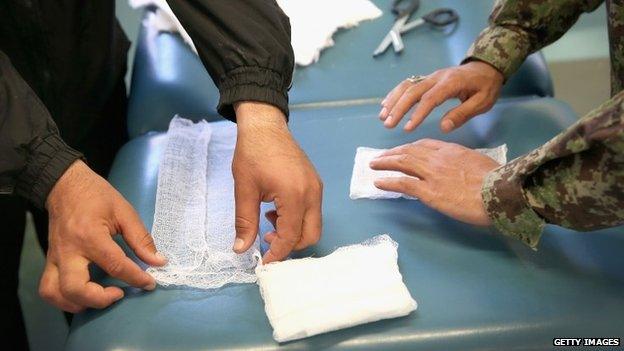
The Afghan National Army is preparing for possible casualties when polling takes place
But there is also some good old-fashioned campaigning.
"One of the candidates came down my street and said 'Hello, I'm running for president and this is why you should vote for me'," one young man in Kabul marvelled. "So I decided to vote for him."
His mother said she was keeping her choice secret, in the best of democratic traditions.
Ghost polling stations
But all the worst traditions of this embryonic democracy could still overwhelm the process and damage its legitimacy at a time when a clear convincing mandate is crucial for whoever takes charge at a most difficult time.
Dr Abdullah Abdullah, President Karzai's main challenger the last time round, is already warning of "massive industrial scale" fraud. Such cries of foul play could imperil the entire process.
There is concern about ballot stuffing, ghost polling stations - the kind of cheating that has marked every election since 2004.
There is also worry that the number of election cards in circulation vastly outnumber the number of registered voters.
Western observers commend what is widely seen as a more robust electoral system with more developed checks and balances.
But there are different assessments of the individuals, hand picked by the palace, who run it.
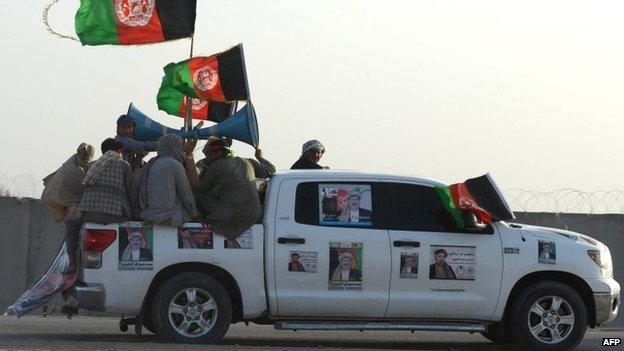
Much will depend on whether a clear front-runner emerges at the head of the pack
On Afghan television, adverts instruct voters on how to spot fraud. "A nationwide observation equals a just election" is its slogan.
But will it be safe?
A deadly wave of Taliban attacks in Kabul, including at the entrance to the heavily guarded interior ministry and the main compound of the Independent Election Commission, has heightened security fears.
The brazen attack on the eve of the Afghan New Year inside the five-star Serena Hotel rattled many foreigners, including a number of election observers, who then left the country.
Defiant response
But for many Afghans, it only strengthened their resolve to carry on.
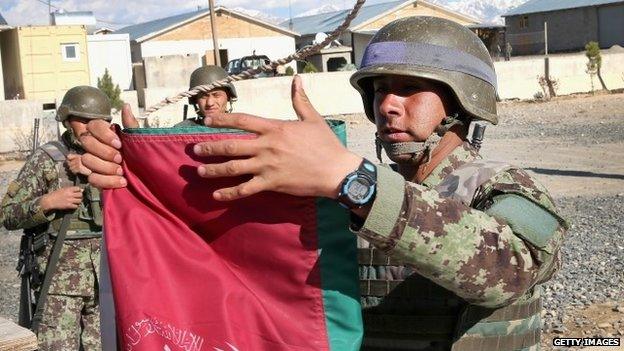
Polling day looks set to be another defining moment for Afghanistan
"We are not scared," declared election officials when I dropped in on their meeting in a hotel while the attack on the election headquarters was underway. "That is our message to the Taliban."
Long queues outside voter registration centres only seemed to get longer in a defiant response to Taliban threats.
Every Afghan election has been overshadowed by speculation about a possible "spectacular attack" and this time is no different. Afghan intelligence officials are warning there could be more.
"What would spectacular mean?" asked Andrew Wilder of the United States Institute for Peace who has seen all the recent elections. "With some 6,500 polling stations across the country, it will be hard to stop the vote."
Speculation also continued, right down to the wire, that palace officials were trying to find cause to halt this exercise but President Karzai has repeatedly vowed to oversee a peaceful political transition.
And there is another momentum underway. A poll conducted by the Free and Fair Election Foundation found that more than 75% respondents planned to vote, even though faith in the electoral process was said to be decreasing.
Afghans will cast their ballot for different reasons: in villages, tribal and local loyalties still run deep; in fast-changing urban areas, Afghans may have different motives to try to make a difference.
I have heard mention many times over the past week that "the silent majority" is now finding a voice after so many punishing years of war. But if that majority speaks on 5 April, will it be heard and what will it say?
This is another defining moment in Afghanistan.